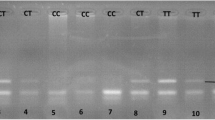Abstract
Stroke is a multifactorial disease caused by the combination of certain risk factors and genetic factors. There are possible risk factors having important role in the pathogenesis of stroke. The most important environmental factors are cigarette smoking and oxidative stress which have different sources. GST (M1, T1, P1) have major roles in detoxification of the products of oxidative stress and they are polymorphic. DNA damages can also be repaired by repair enzymes such as OGG1 and XRCC1 which are highly polymorphic and have pivotal roles in repair systems. In the present study, we investigated that polymorphisms in genes involved in detoxification and DNA-repair pathways might modify the individual’s risk for ischemic stroke. Furthermore, the products of oxidative stress and antioxidant capacity were measured and the impact of gene polymorphism on them was evaluated. Our data showed that OGG1 Ser326Cys and XRCC1 Arg399Gln gene polymorphisms had impacts on the development of stroke.

Similar content being viewed by others
References
Truelsen T, Begg S, Mathers C (2000) The global burden of cerebrovascular disease. WHO. http://www.who.int/healthinfo/statistics/bod_cerebrovasculardiseasestroke.pdf. Accessed 30 Sep 2015
Ozturk S (2009) Serebrovasküler hastalık epidemiyolojisi ve risk faktörleri-Dünya ve Türkiye perspektifi. Turk J Geriatr 13(1):51–58
Yıldız Z, Gül HL, Börü ÜT (2013) İskemik inmede metabolik sendromun sıklığı ve mortaliteye etkisi. Turk J Cerebrovasc Dis 19(3):88–94. doi:10.5505/tbdhd.2013.69875
Dizdaroglu M (2015) Oxidatively induced DNA damage and its repair in cancer. Mutat Res 763:212–245. doi:10.1016/j.mrrev.2014.11.002
Karahalil B, Bohr VA, Wilson DM 3rd (2012) Impact of DNA polymorphisms in key DNA base exicision repair proteins on cancer risk. Hum Exp Toxicol 31:981–1005. doi:10.1177/0960327112444476
Karahalil B, Kocabas NA, Ozçelik T (2006) DNA repair gene polymorphisms and bladder cancer susceptibility in a Turkish population. Anticancer Res 26:4955–4958
Karahalil B, Kesimci E, Emerce E, Gumus T, Kanbak O (2011) The impact of OGG1, MTH1 and MnSOD gene polymorphisms on 8-hyrdoxy-2′-deoxyguanosine and cellular superoxide dismutase activity in myocardial ischemia-reperfusion. Mol Biol Rep 38:2427–2435. doi:10.1007/s1103-010-0378-6
Suzen HS, Guvenc G, Turanli M, Comert E, Duydu Y, Elhan A (2007) The role of GSTM1 and GSTT1 polymorphisms in head and neck cancer risk. Oncol Res 16:423–429. doi:10.3727/000000007783980828
Karahalil B, Orhan G, Ak F (2015) The impact of detoxifying and repair gene polymorphisms and the levels of serum ROS in the susceptibility to multiple sclerosis. Clin Neurol Neurosurg 24(139):288–294. doi:10.1016/j.clineuro.2015.10.028
Wang J, Zou L, Huang S, Lu F, Han L, Song Z, Xu Z (2010) Genetic polymorphisms of glutathione S-transferase genes GSTM1, GSTT1 and risk of coronary heart disease. Mutagenesis 25(4):365–369. doi:10.1093/mutage/geq014
Um JY, Kim HM, Han SH, Cho KH, Moon BS, Hong SH (2006) Glutathione S-transferase gene polymorphism and ischemic cerebrovascular disease. Int J Neurosci 116(1):55–65. doi:10.1080/00207450690962398
Karam RA, Pasha HF, El-Shal AS, Rahman HM, Gad DM (2012) Impact of glutathione-S-transferase gene polymorphisms on enzyme activity, lung function and bronchial asthma susceptibility in Egyptian children. Gene 497(2):314–319
Wang R, Wang Y, Wang J, Yang K (2012) Association of glutathione S-transferase T1 and M1 gene polymorphisms with ischemic stroke risk in the Chinese Han population. Neural Regen Res 7(18):1420–1427. doi:10.3969/j.issn.1673-5374.2012.18.009
Zhong S, Wyllie AH, Barnes D, Wolf CR, Spurr NK (1993) Relationship between the GSTM1 genetic polymorphism and susceptibility to bladder, breast and colon cancer. Carcinogenesis 14(9):1821–1824
Strange RC, Jones PW, Fryer AA (2000) Glutathione S-transferase: genetics and role in toxicology. Toxicol Lett 112–113:357–363
McIlwain CC, Townsend DM, Tew KD (2006) Glutathione S-transferase polymorphisms: cancer incidence and therapy. Oncogene 25(11):1639–1648
Türkanoğlu A, Can Demirdöğen B, Demirkaya S, Bek S, Adali O (2010) Association analysis of GSTT1, GSTM1 genotype polymorphisms and serum total GST activity with ischemic stroke risk. Neurol Sci 31(6):727–734. doi:10.1007/s10072-010-0330-5
Ada AO, Kunak SC, Hancer F, Soydas E, Alpar S, Gulhan M, Iscan M (2012) Association between GSTM1, GSTT1, and GSTP1 polymorphisms and lung cancer risk in a Turkish population. Mol Biol Rep 39(5):5985–5993. doi:10.1007/s11033-011-1411-0
Um JY, An NH, Kim SH, Lee KM, Kim YS, Jang H, Cho KH, Moon BS, Kim HM (2003) Genetic susceptibility to ischemic cerebrovascular disease in Koreans. J Mol Neurosci 20(1):31–38. doi:10.1385/JMN:20:1:31
Polonikov A, Vialykh E, Vasil’eva O, Bulgakova I, Bushueva O, Illig T, Solodilova M (2012) Genetic variation in glutathione S-transferase genes and risk of nonfatal cerabral stroke in patients suffering from essential hypertension. J Mol Neurosci 47(3):511–513. doi:10.1007/s12031-012-9764-y
Nørskov MS, Frikke-Schmidt R, Loft S, Sillesen H, Grande P, Nordestgaard BG, Tybjaerg-Hansen A (2011) Copy number variation in glutathione S-transferases M1 and T1 and ischemic vascular disease: four studies and meta-analyses. Circ Cardiovasc Genet 4(4):418–428. doi:10.1161/CIRCGENETICS.111.959809
Sultana S, Kolla VK, Peddireddy V, Jeedigunta Y, Penagaluru PK, Joshi S, Penagaluru UR, Penagaluru PR (2011) Glutathione S-transferase M1 and T1 gene polymorphisms in South Indian stroke patients. J Med Genet Genom 3(4):65–70
Shyu HY, Shieh JC, Ji-Ho L, Wang HW, Cheng CW (2012) Polymorphisms of DNA repair pathway genes and cigarette smoking in relation to susceptibility to large artery atherosclerotic stroke among ethnic Chinese in Taiwan. J Atheroscler Thromb 19(4):316–325. doi:10.5551/jat.10967
Mahabir S, Abnet CC, Qiao YL, Ratnashinge LD, Dawsey SM, Dong ZW, Taylor PR, Mark SD (2007) A prospective study of polymorphisms of DNA repair genes XRCC1, XPD23 and APE/ref-1 and risk of stroke in Linxian, China. J Epidemol Community Health 61(8):737–741. doi:10.1136/jech.2006.048934
Kaur J, Arora S, Singh B, Thakur LC, Gambhir J, Prabhu KM (2011) Role of oxidative stress in pathophysiology of transcend ischemic attack and stroke. Int J Biol Med Res 2(3):611–615
Acknowledgments
The authors would like to give special thanks to all participants. We wish also to thank Aslıhan Alhan for statistical analysis.
Author information
Authors and Affiliations
Corresponding author
Ethics declarations
Conflict of interest
The authors declare that there is no conflict of interest.
Rights and permissions
About this article
Cite this article
Orhan, G., Elkama, A., Mungan, S.Ö. et al. The impact of detoxifying and repair gene polymorphisms on oxidative stress in ischemic stroke. Neurol Sci 37, 955–961 (2016). https://doi.org/10.1007/s10072-016-2524-y
Received:
Accepted:
Published:
Issue Date:
DOI: https://doi.org/10.1007/s10072-016-2524-y




